
Article
Midyear Update on Recent OIG Activity for Life Sciences Legal and Compliance Professionals (Part 2)
In our recently published part one of this two-part Client Alert series, we provided summaries of recent Department of Health and Human Services (DHHS) Office of Inspector General (OIG) Advisory Opinions, which had favorable and unfavorable outcomes. In part two of the series, we highlight two additional recent Advisory Opinions (one favorable and one unfavorable). Consistent with our communications in part one, we note that these Advisory Opinions, as with all Advisory Opinions, are only binding with respect to the Requestor and should not be relied upon by others.
Advisory Opinion 25-06 (Favorable)
The Requestor, a pharmaceutical manufacturer, proposed an arrangement for patients undergoing a one-time, potentially curative gene therapy treatment consisting of certain financial assistance (Arrangement). The FDA-approved therapy is for a rare and potentially fatal childhood genetic disease affecting fewer than 40 children annually in the United States (Therapy). The Therapy, which costs more than $4 million per dose, is currently the only approved treatment available for the genetic condition, offering the potential to halt or significantly slow disease progression, while current standard of care options are limited to symptom management and supportive measures. In its Advisory Opinion, OIG concluded that the Arrangement would pose a low risk of fraud and abuse, despite the provision of the financial assistance potentially resulting in “prohibited remuneration” if the requisite intent were present.
Under the Arrangement, Requestor would cover travel, lodging, meals, and related incidental expenses for eligible patients and up to two caregivers throughout the extended treatment process and post-Therapy monitoring. The Arrangement will be administered by a patient support program that will assess eligibility, including a (US) residency requirement and a household income below 600% of the Federal Poverty Level. Additionally, patients would only be eligible if they lacked access to other financial resources, such as insurance or charitable aid, and federal healthcare programs may not be billed for the costs associated with this assistance. It would only be available to patients with an on-label prescription for the Therapy. Further, patients must live beyond a certain distance of one of the designated treatment centers to receive reimbursement for either ground or air transportation as well as the cost of lodging, meals, and incidentals during various treatment phases of the Therapy.1
OIG found that the Arrangement presents a low risk of fraud and abuse under the Federal Anti-Kickback Statute based upon several factors: (i) the Therapy is administered only once thus minimizing the risk of triggering ongoing or unnecessary utilization of federally reimbursable services; (ii) the Arrangement removes a barrier to receiving necessary medical care only administered by/in a Treatment Center as patients must travel considerable distances to receive treatment rendering it difficult or impossible for some; and (iii) the Arrangement allows compliance with provider’s recommendation for patients to remain at a Treatment Center for an extended period of time to monitor for potential complications as a result of the Therapy.
The Arrangement also includes additional safeguards to mitigate the risk of fraud and abuse, including that Requestor will not cover any expenses for which insurance or any third-party charitable assistance covers, nor does it promote the Arrangement to providers as a justification to prescribe the Therapy.
Finally, OIG found that the Arrangement satisfied the “Promotes Access to Care” exception under the Beneficiary Inducements Civil Monetary Penalties law. This exception permits certain types of assistance, provided that it improves patient access to federally reimbursable medical services, poses a low risk of harm, and does not interfere with clinical judgment. OIG opined that the Arrangement met these criteria because it enables access to medically necessary care for a vulnerable patient population, is subject to clearly defined limitations (i.e., strict eligibility criteria), and includes controls that minimize the likelihood of abuse or undue influence over prescribing decisions.
In conclusion, OIG determined that by utilizing structured and objective eligibility requirements and program safeguards, the Arrangement offers critical support to eligible patients while upholding the integrity of federal anti-fraud and abuse protections.
OIG further concluded that, although the proposed Arrangement would generate prohibited remuneration if the requisite intent were present, it would not impose sanctions in connection with the Arrangement under the Federal Anti-Kickback Statute.
Advisory Opinion 25-08 (Unfavorable)
The Requestor, a medical device company, supplies “bill-only” surgical medical devices to its customers—hospitals, health systems, and ambulatory surgery centers (Customers)—and proposed paying a third-party billing vendor (Vendor) to access a billing system used by some of Requestor’s Customers (Arrangement). In an unfavorable Advisory Opinion, OIG concluded that the proposed Arrangement was not sufficiently low risk and did not fall within a safe harbor.
According to Requestor, a surgeon would typically select “bill-only items” during surgery, and the Customer would record the items used to generate a purchase order. Requestor would then prepare an invoice based on the purchase order and the Customer would make payment to the Requestor. The Vendor uses software to facilitate Customer purchases of bill-only items and some Customers requested or required Requestor to use the Vendor rather than use the process described above. Under the Arrangement, Vendor would charge Requestor a licensing fee of approximately $395 annually per representative to use the Vendor’s bill-only portal (Bill-Only Portal).
Requestor estimated it would pay yearly fees of approximately $1.2 million to the Vendor, as approximately 3,000 field representatives would need a Vendor license if each of its representatives had at least one Customer that requested or required Requestor to use the Bill-Only Portal. While OIG stated in a footnote that the Requestor indicated it had proposed paying one license fee per Customer to the Vendor (which Requestor would invoice back to each Customer), instead of payment of a license fee for each individual representative, to which the Vendor objected, it did not opine on whether it would have reached a different conclusion under these circumstances. Requestor made various certifications, including that it has internal accounts receivable processes for the receipt and payment of invoices and that the Bill-Only Portal was redundant to its existing activities and operations.
OIG concluded that the proposed Arrangement implicated the Federal Anti-Kickback Statute because the Vendor fees would be used to arrange for Customers’ purchase of items that may be reimbursable by Federal health care programs.2 OIG opined that the Arrangement may result in cost savings to Customers and that, therefore, Requestor’s fee payments to the Vendor could constitute remuneration to Customers to induce the purchase of medical devices reimbursable by a federal health care program. OIG pointed out that the substantial payments to access the Bill-Only Portal were part of an effort to retain and potentially expand business from Customers and that the Bill-Only Portal was redundant to Requestor’s existing accounts receivable processes. OIG also asserted that the proposed Arrangement presented anti-competitive risks and risks of inappropriate steering to Requestor over Requestor’s competitors that are not able or willing to pay the Vendor fees. OIG noted that this was demonstrated by one Customer’s removal of Requestor from a preferred vendor list and putting Requestor’s supply contract out to bid since Requestor did not agree to pay the Vendor.
Conclusion/Takeaways
As previously noted, Advisory Opinions are limited in scope and application to the requesting entity and should not be relied upon by others, but they can still provide general insight to legal, compliance, and business teams on how OIG may evaluate other similar arrangements. In fact, OIG itself recognized in its 2023 General Compliance Program Guidance that “stakeholders often look to published advisory opinions to understand OIG’s views of particular arrangements and that advisory opinions may inform a party’s review of a potential business arrangement, including identifying risks and potential application of safe harbors.”3 In addition, a favorable Advisory Opinion by OIG does not mean that an arrangement will not run afoul of other state or federal laws upon implementation. Many of these arrangements would likely necessitate additional legal and compliance evaluation of privacy and other laws, industry practices and guidelines, and other matters. Of course, when evaluating the proposed arrangements, companies should always scrutinize their own internal compliance policies and trainings to ensure arrangements comport with these as well.
Taken all together, the most recent OIG Advisory Opinions continue to provide valuable insight for the life sciences industry into the government’s approach to business arrangements that involve remuneration to patients, providers and third-party companies. The overarching principles that it relied upon should serve as a reminder that the reach of the Federal Anti-Kickback Statute is broad, and that it applies to any suspect arrangement involving “remuneration,” regardless of who the recipient is, if the result is increased costs to a government payer. The latest Advisory Opinions also continue to demonstrate OIG’s flexibility in evaluating evolving industry practices, recognizing that challenges posed by rare disease treatments and the use of unique therapies and business arrangements must be thoughtfully considered and structured given fraud and abuse and other legal, compliance (and business) implications that they may have.
Porzio’s team of Life Sciences attorneys is always available to provide legal and compliance assistance to companies, including related to the development and commercialization of their products, evaluation of potentially high-risk activities, and other activities and interactions.
1 As part of the Arrangement, the Requestor would identify up to ten treatment centers nationwide, selected based on their ability to offer safe and effective administration of the Therapy, using several objective criteria (Treatment Center(s)).
2 OIG stated that the safe harbor for personal services and management contracts and outcomes-based payment arrangements did not apply to the Arrangement, as Requestor cannot certify that the aggregate services contracted for would not exceed those which are reasonably necessary to accomplish the commercially reasonable business purpose of the service.
3 See part 1 of this Client Alert, where we summarize Advisory Opinion 25-05, which relied upon the Warranties Safe Harbor in finding an arrangement acceptable.


